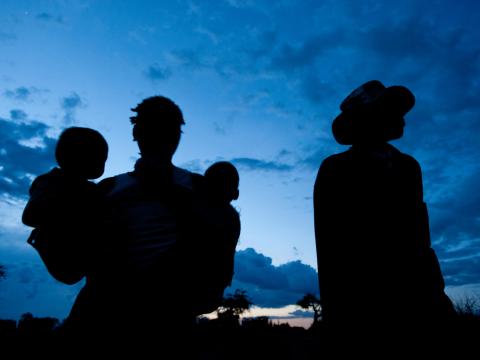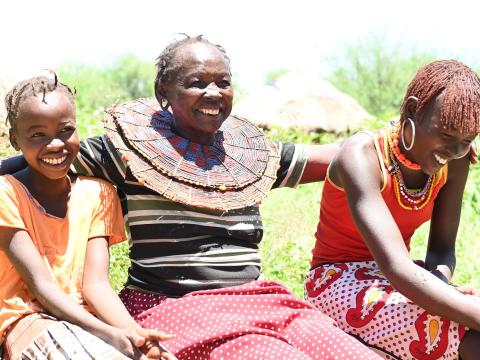
Three reasons a children's charity tackles violence against women
Abigail shares three ways intimate partner violence against women impacts child well-being and what World Vision is doing to address it.
Abigail Howe-Will, Gender Equality and Social Inclusion Technical Director
Ending violence against women and girls is a high priority in World Vision’s work to increase child well-being. Our programming addresses diverse forms of violence against women and girls, including female genital mutilation, child marriage, and intimate partner violence (IPV).
Some may wonder why we address intimate partner violence as a child-focused organisation. The reason is because there are numerous correlations between this kind of violence and child well-being. The negative impact of it reaches beyond individual women and men to children in their households in three important ways.
Firstly, intimate partner violence, child abuse and neglect often occur in the same households.
Secondly, exposure to intimate partner violence impacts children’s well-being. A study on intimate partner violence found women who experienced it had higher levels of emotional distress. This impacts the care they can give to children. World Vision recently conducted research across its Middle East and Eastern Europe offices to explore the links between women’s empowerment and their children’s well-being. In Syria, the research found when women are protected from intimate partner violence, their children are more likely to have positive attitudes towards learning, better diet diversity, good mental health and be protected from violence themselves.
Thirdly, children’s exposure to intimate partner violence against their mothers, as well as their own experience of abuse as a child, is tied to violence they experience or perpetrate in adulthood. The intergenerational cycle of violence cannot be changed unless households are peaceful, harmonious places where children and adults have lives free from violence.
World Vision uses various models to support mental health as an important strategy to prevent gender-based violence intimate partner violence and to respond to poor mental health. World Vision tested individual Problem Management Plus with women with a history of suffering gender-based violence in urban Kenya. Women who participated in this programme showed significantly reduced psychological distress after the intervention. In another study in Kenya, World Vision piloted the use of Group Problem Management Plus (GPM+) to assess the impact of including messages about intimate partner violence in communities alongside implementing Group Problem Management Plus for men with common mental health problems. The project evaluation found the approach contributed to reductions in men’s impaired functioning, alcohol use and violence against women.
Through a project in South Sudan called Fortifying Equality and Economic Diversification for Resilience World Vision, in partnership with CARE Canada and War Child Canada, focuses on addressing gender inequality through agriculture and food security activities. These activities are the platform to engage women and men and to shift behaviours and harmful attitudes in their community and in their families that give rise to intimate partner violence.
World Vision recognises the critical role that men and boys, alongside women and girls, play in advancing gender equality and women and girls’ empowerment. In Ethiopia, World Vision mobilised groups of men through Male Dialogue Groups to highlight the role of existing harmful practices such as child marriage, gender-based violence, and women's and girls’ high domestic work in contributing to gender injustice. This resulted in positive changes in men’s behaviours with their wives and daughters reporting a decline in intimate partner violence.
In Bangladesh, the USAID-funded Nobo Jatra (New Beginnings) project used a similar approach to promote shared decision-making in households, the equal division of tasks between spouses in the household and support healthy relationships characterised by non-violence and gender equality in food security programming. In 2020, a review of the project found women had gained awareness of their rights and challenged intimate partner violence as a norm. Male and female participants reported to feeling able to peacefully resolve conflict within their families.
In Vanuatu, World Vision is implementing Men Be the Change, which works with men and their families to reduce and cease family and intimate partner violence. The programme addresses attitudes and behaviours around abuse, while helping men understand the impact of their violence on others. A recent study found men, as a result of the programme, use gentler language to communicate, even when expressing disappointment and unhappiness; recognise the value of listening to their wives' opinions; and have different understandings of gender roles.
World Vision works with faith-based partners to address intimate partner violence too; partners in the faith community (especially faith leaders) are often important gatekeepers in communities and societies. They support families and often respond to violence within households. World Vision works through its Channels of Hope approach to engage faith leaders and their communities in addressing both intimate partner violence and child protection concerns. Further, World Vision’s Celebrating Families approach, is a faith-based approach focused on family relationships. In Myanmar, Celebrating Families was found to support healthy family relationships.
Beyond its many programmes to address inequality and violence, World Vision is strengthening its commitment to gender equality and to addressing violence against women and children as part of realising our current strategy, Our Promise. World Vision has recently approved an organisation-wide Gender Equality and Social Inclusion Policy that will guide World Vision’s work to address violence within families.
Abigail Howe-Will is World Vision's Gender Equality and Social Inclusion Technical Director. She is a passionate gender advisor with 14 years' experience in violence prevention and women’s empowerment work in the US, Philippines, Timor-Leste and Melanesia.
(Article written with contributions from Amy Gardiner, Safeguarding Technical Advisor, World Vision Vanuatu; Kate Kobaidze, Sponsorship, Gender and Safeguarding Leader, World Vision MEERO; Merydth Holte-McKenzie, Gender Equality Advisor, World Vision Canada; Phiona Koyiet, Senior Technical Advisor Mental Health and Psychosocial Health, Sarah Shteir, Gender Advisor, World Vision Australia and Socorro Maminta, Gender Technical Specialist, World Vision Canada; Zayid Douglas, Gender Integration Technical Advisor, World Vision US)

